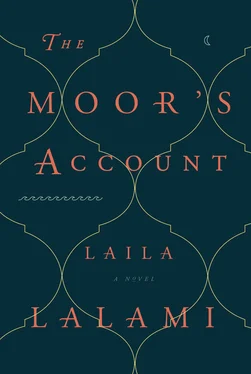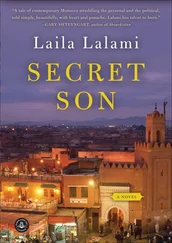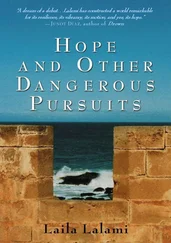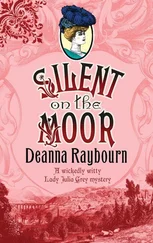I felt the hair on the back of my neck stand. Was this the stroke of good fortune promised by my discovery of the khamsa? Could it be that the very thing I had once dreaded might allow me to return to freedom?
But Dorantes replied: How generous of Your Highness to think of him. But Estebanico has been with me for ten years now and I am so attached to him I have never considered selling him. As for the women, they are needed to attend to my household, and I prefer for them to stay here in the capital, where they might be able to receive further guidance from the church.
As you wish, the viceroy said. But know that His Majesty will look most kindly on those who serve him in his hour of need.
Mendoza walked us out to the palace courtyard. When they saw him approach, the sentinels straightened up and clicked their heels. A group of swallows were taking turns swooping down into the water fountain for a drink. The sun was high in the sky, and the viceroy tilted his face toward it, soaking up the warmth. Another beautiful day, he said. Then he added, almost as an afterthought: Do you remember Doña María de la Torre? The kind lady in the black silk dress at the banquet last week? She inherited an encomienda from her husband — quite large, fifteen hundred Indians. I would be most pleased to make introductions.
IT WAS A WARM EVENING in summer. Castillo and I were sitting in the patio, under the canopy of white bougainvillea that grew on the gallery rails. From the city square came the faint sound of music, fiddles and drums played for the entertainment of passersby. But the house was dark and quiet; the servants had not yet begun to prepare dinner. Castillo had just returned from a walk to Lake Tezcuco with Doña Isabel, a lady he had met at one of the viceroy’s dinners. Now he slipped off his black shoes and white hose, and vigorously rubbed his left foot between the toes of his right, satisfying an itch or a rash. How I hate wearing socks, he complained.
Why wear them if you do not like them? I asked.
He shrugged. I have to. I cannot walk around the capital barefoot, you know.
Something crackled under the lavender bushes and one of the greyhounds at my feet lifted its head, but, sensing nothing, went back to sleep. Did you enjoy the walk? I asked.
I did, Castillo said. Doña Isabel sailed all the way from Castile to be with her husband, the alderman of the city, but not six months later he was killed, leaving her alone in New Spain. She has no family here in the capital, only friends she has made since her arrival.
Like you, then?
Yes. And she is from Tordesillas, not far from Salamanca.
Castillo’s face was concealed by the darkness, but from his voice I sensed his excitement at the acquaintance he had made. In the bushes, the grasshoppers began to sing. A candle was lit at the kitchen window, as if the house had opened one eye and was watching us.
What about Kewaan? I asked after a moment.
Nothing will change between us, he said earnestly. This is different.
Everything was different in New Spain, I thought. Cabeza de Vaca had left. Dorantes was rarely home now; he was courting the widow de la Torre, to whom the viceroy had introduced him. The chair that he normally occupied sat between us now, empty. The memory of that day with the Carancahuas, when I had woken up to find he had escaped without us, returned to me all of a sudden. I asked Castillo: Did you ever talk to Dorantes about the notary?
Castillo ran his tongue on his lips. He looked so much older now than when I had first met him and, although he had always been very thin, our prolonged stay in Tenochtitlán had filled out his narrow frame to the point that he had become portly. With his eyes to the ground, he said: I asked Dorantes several times why he would not sign your papers, Estebanico.
And what did he say?
That it was none of my concern.
Reader, I should not have been surprised by this retort, but I was. I think there was still some small part of me that stubbornly held on to the belief that Dorantes had been changed forever by our common experience in the Land of the Indians. We had been hungry together. We had shivered in the cold together. We had worked side by side for the Carancahuas and side by side we had tried to heal the Indians in the Land of Corn. But whatever transformation had taken place within him had slowly been undone by his prolonged stay in the capital, where there was endless talk of money and power.
BY THE TIME the fall season started, Dorantes announced that he would marry the widow de la Torre. Castillo, too, decided that Doña Isabel, and her estate, were a good match for him. The three men I had once thought of as brothers were moving on: they were seeking royal grants, or getting married, or acquiring estates, forgetting everything that we had been through in the north. But I did not have the luxury to put the past behind me. I had made the mistake of once again placing my fate in the hands of another man and I had to find a way out.
I was sitting with my greyhounds by the window one afternoon when Dorantes came in. He began to chatter about the expedition that the viceroy was preparing. It was to be led by a young man named Francisco Vásquez de Coronado, and it would include a friar from France, a certain Marco de Niza, and several hundred Aztecs. The viceroy had once again asked Dorantes to sell me to him so that he could use me as a scout.
And what did you say? I asked.
I refused, of course, Dorantes said.
Outside, the shadows of the orange trees had begun to lengthen; it would be dark soon. The lavender bushes swayed in the wind. Dead leaves eddied across the courtyard.
But the Seven Cities of Gold, I said. What an incredible opportunity!
It is, he sighed.
And if the friar and I manage to reach them, just imagine what we will find. You would have a claim to all those riches.
The thought of the Seven Cities silenced Dorantes for a long while. All his fantasies of gold and glory returned to him and he found them hard to resist. Perhaps he could have a second chance at making them come true. Perhaps he could finally receive the rewards that had been promised to him when he was a younger man in Seville. Perhaps he could become famous for a success, rather than a failure.
Turning away from the window, I added: Besides, who could refuse an offer from the viceroy of New Spain?
No one, he replied.
Dorantes was lost in thought, weighing the alternatives that had been presented to him: keep me with him in Mexico, where he faced the daily drudgery of running an estate; or send me to the north, where fortune might smile on him. From above the fireplace, the king of Castile watched us with equanimity, confident in the knowledge that, whatever the outcome, his share was secure.
You are right, he said at last. You must go.
I looked at his face — the scar on his right cheek, the lines around his eyes that had deepened over the years, the gray hair on his temples and beard. Now he started to chew his lower lip. I wondered if he had ever learned to read the expressions on my face the way I had learned to read his. I suspected he had not or he would have realized that I was finally going to set myself free.
COME, I SAID. COME. Oyomasot smelled of lavender — a new scent on her, a scent acquired from living in this guesthouse — but I loved it, for it mixed together the memory of old and new, past and present. From very far away came the sound of horns, celebrating one imperial triumph or another, but in the bedroom it was very quiet, the only sound the ruffling of her dress. I unlaced her corset, but when finally I freed her of it, Oyomasot still turned away from me. What is it? I asked.
Are you sure your plan will work?
Yes.
You have made promises before.
Читать дальше












